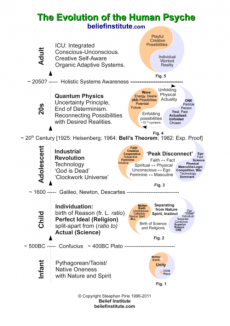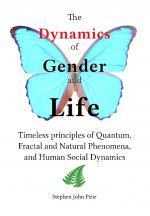[Posted 24 Dec. 2008, 10.19pm, by Stephen Pirie]
Overview
When seeking answers to questions about spirit, or indeed any aspect of life, we can apply some basic principles to see the error or inadequacy of various belief-systems.
In regards to "higher-powers", or God, or any such perceived independent authoritative spiritual entities, it is a simple matter to extend spiritual beliefs to their "maximum", to reveal the inadequacy of the base belief (in that an idea or belief that is absurd in the extreme, remains a "little absurd" in the "less extreme" circumstances of everyday life).
For example, let's assume we have a higher spiritual power guiding our behaviours. Let's maximize that idea, such that we have total, complete guidance to the extent that we don't have any choice (total, complete guidance means we'd be on "automatic" without any conscious ability to choose, or experience "free will"). Clearly a "God" that has control over us (in the extreme) would be a nonsense situation. So then what is the reality? The Truth?
Life involves an unending paradox of free-will and constraint (bounded by the systems -- families, communities, nations, universe -- within which we live); of infinite possibility and limited actuality; of individuality and 'togetherness', of One and All.
We sense the validity of this paradox, and it's profound relevance to our lives:
"First comes paradox! ... A paradox does not make sense to our rational minds. A paradox captivates a surplus of meaning that cannot be contained with the structure of rational discourse. For an adult spirituality of our time this is a crucial issue. Adults today are rarely satisfied with compelling rational explanations; there is a "surplus of meaning" that transcends rationality, yet to mature adults it feels essential in our search for deeper meaning. The ability to embrace paradox is central to this sense of maturity."1
Details
Within any collective, we may receive information and guidance from wise, experienced folk.
As is explained in other articles, our conscious knowledge and choices cannot be totally and completely disconnected from, or entirely unrelated to, a deeper unconscious nonlocal interconnectedness. To be completely disconnected would require that no connectivity, influence or relationship with the unconscious (whatever its nature) be available.
Accordingly, when we gain or receive guidance from others - be it from friends, colleagues, experts, consultants, inner voices, spirits, God or collective-unconscious - it necessarily remains our responsibility to choose the merit and suitability of that advice.
Irrespective of however enlightened one becomes, there remains the process of choice - of converting possibility into particular lived experience.
The common new-age or religious belief that we may enter some enlightened state of consciousness or after-life, requires a fundamental disconnect between present awareness and some future 'other' state.
Such beliefs are a result of racial immaturity, in a similar manner that a child believes that later stages of growth are represented by the believed perfection and all-knowing awareness and abilities of parents.
In resting our responsibility for shaping and determining our lives, we give our power over to that (presumed) external, outside agency (spirit, higher-self, authority, God, teacher, guru, expert etc.). This belief disconnects our conscious awareness from the immense potential to gain the (unlimited) cooperative power resident within.
We can and do quite naturally rely on "higher-powers" (of unconscious collectives) to create our circumstances, but those powers and potentials always remain within us and subject to our conscious choices. We are never victims to unconscious spiritual forces.
The God-as Principle affirms that any external agency (e.g... God) is in fact merely a deeper part of ourselves. Thus, where religion goes wrong, so to speak, is to separate that higher inner power from our individual conscious thoughts and awareness.
Traditionally, the institutions of both science and religion have taught us to disconnect ourselves from our intimate, intuitive awareness and our inner potential to receive unlimited cooperation.
the belief in a God over us,
not God-as-Us.
That disconnect blinds our realisation that whatever magic or miracle is created is initiated and funneled through us, by us. The miracles of life remain our responsibility ... not some super-spirit, sitting over and above us.
Conscious choice is always a necessary part of creating our reality. However, we can and must rely on deeper, unconscious parts of ourselves, which are beyond direct conscious control. This is the paradox of consciousness, that we must straddle conscious and unconscious collaborative connections.
The God-as Principle affirms that as God-as-us, whatever higher-powers or potentials exist, they are latent within us and immediately accessible ... if 'we' so choose. As Jesus himself is quoted to have said:
When ye pray (visualize)
Believe that ye receive them
and ye shall have them2
Obviously, if such potentials exist and are immediately accessible, the question that becomes significant is what stops us from tapping those unlimited God-potentials? By once again applying the God-as Principle, we should be able to appreciate that we limit ourselves (due to inexperience) and are limited by the collective of which we are part (as more fully explained, these limitations are largely due to the immaturity and inexperience of the human race).
The God-as Principle affirms that whatever exists in the "spiritual" or in the realm of God is also reflected in everyday life. For this not to be the case would require a disconnect between "here" (everyday living) and "there" (some idealised spiritual other-state which is "not-here").
 "The Dynamics of Gender and Life" ebook is now available at
"The Dynamics of Gender and Life" ebook is now available at